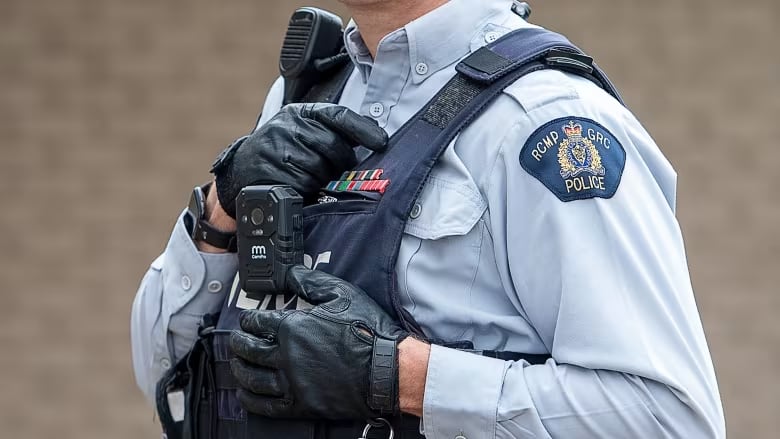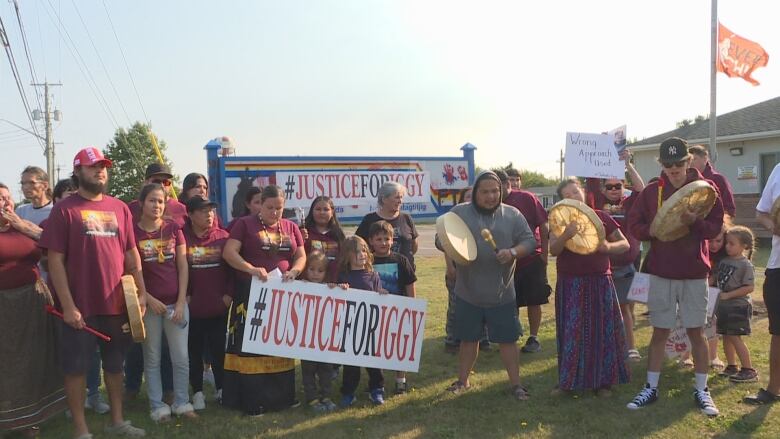RCMP plan to deploy body cameras this fall
RCMP say officers involved in Elsipogtogshooting didn't have cameras

The two officers involved in the fatal shooting of a man in Elsipogtog First Nation this month weren't wearing body cameras, something that could have offered another perspective for investigators and a future inquest.
RCMP confirm that no officers in New Brunswick are currently using the cameras, though that's expected to change in the coming months as a delayed national rollout of the technology begins.
Marie-Eve Breton, a spokesperson for the Mounties, said in an email Tuesday they plan to start a phased rollout in New Brunswick this fall. The Mounties expect all frontline officers across the country to be equipped with the cameras by late 2025.
Michael Boudreau, a criminologist at St. Thomas University in Fredericton, said the lack of cameras will be an issue for the investigation of the fatal shooting of a man in Elsipogtog,given it appears there weren't many people nearby when Steven (Iggy) Dedam was shot by an officer on Sept. 8.
"Body-worn camera footage is not foolproof, but it would have given us another perspective on what happened that day," Boudreau told Information Morning Moncton on Sept. 12.

That added perspective is something Codiac Regional RCMP's commanding officer says he welcomes.
"Myself and all my colleagues are looking forward to it just for so many different reasons, evidentiary reasons," Supt. Benoit Jolette told Moncton council this week.
"It's gonna be a game changer for the type of interactions that we have with the public, on both sides of the spectrum."
Jolette said the cameras were beginning to arrive in New Brunswick and have been sent to various detachments. He wasn't sure when Codiac, which polices Moncton, Dieppe and Riverview, would receive its cameras.
RCMP say officers were responding to a call about a "a suicidal male armed with a weapon," which the man wouldn't drop. The Serious Incident Response Team, known as SIRT, is investigating whether the shooting was a criminal offence.
SIRT has previously said that preliminary information suggests one of the two officers attempted to use a Taser but the less-lethal weapon was ineffective,and the second officer shot the 34-year-old.
Two members of Dedam's family say they were on the phone with the man during the shooting, arriving at the scene just after they heard the shots.
"I hope that the RCMP continue their rollout of body-worn cameras," Boudreau said.
"They are behind many other municipal police forces who have these cameras. Again, they are not a foolproof technology, but in this case it would have given us at least one more perspective of the tragic events that unfolded."
Inquest to examine shooting
What led to Dedam's death will be the subject of a coroner's inquest once other investigations, such asSIRT's, are complete, a spokesperson for New Brunswick's Department of Public Safety confirmed.
An inquestjury hears testimony from witnesses and reviews evidence about a death and can issue recommendations to avoid similar fatalitiesin the future.
Dedam is the third Indigenous person to be shot and killed by police in New Brunswick in less than five years.

The deaths of Chantel Moore and Rodney Levi in June 2020, both of which police said were holding weapons they wouldn't drop, led to coroner's inquests.
The EdmundstonPolice Force, whose officer shot Moore, already planned to buy and deploy body cameras by the time of the 2022 inquest into her death.
The federal government agreed to fund body-worn cameras for RCMP after in 2020, weeks after the death of George Floyd's in Minneapolis. The plan was to start deploying the cameras by late 2021, but by November of that year a supplier had yet to be selected.
The Levi inquest in the fall of 2021 recommended RCMP "expedite the deployment of body cameras to all officers nationwide."
Field testing of cameras took place in Nova Scotia, Alberta and Nunavut. The RCMP say the tests were deemed a success.
The cameras, supplied by Axon Public Safety Canada, Inc., are expected to be activated by officers responding to mental health calls, during interactions with people in crisis, crimes in progress, investigationsand at protests.
A policy lays out when officers can turn off the cameras.
In 2020 the federal government budgeted to spend $238.5 million over six years to deploy the cameras and set up a storage system for the recordings.
The government agreed to fund the first three years of the deployment, with provinces or municipalities that have policing contracts with the Mounties then expected to start paying as well.













_(720p).jpg)


 OFFICIAL HD MUSIC VIDEO.jpg)
.jpg)



























































































